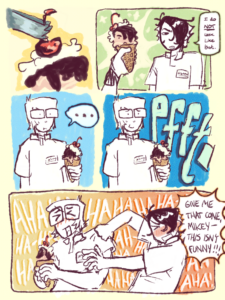On Tuesday, it was announced that Khaled Abdelwahhab has become the first Arab nominated for recognition as “Righteous Among the Nations.” This is a Holocaust honor that is given to non-Jews who put their lives in jeopardy to save Jews from Nazi persecution. Abdelwahhab hid a group of Jews on his farm in Tunisia, keeping them from Nazi imprisonment or worse in North Africa at a time when approximately 100,000 Jews resided in Tunisia.
This opens up a new area of discussion. I’d like to hear what president Mahmoud Ahmadinejad of Iran has to say after this development. Does he still think that the Holocaust is a myth after a fellow Arab helped Jews?
The Holocaust is obviously not a myth, and the nomination of an Arab for this award shows that there were Arabs at the time who thought that the Jews needed saving from something. This affirmation makes it harder for the Arab world to deny the existence of the Holocaust.
The Yad Vashem commission, the group that bestows this honor, still has yet to approve Abdelwahhab’s status as “Righteous Among the Nations,” but if and when they do, it will hold great significance. This honor has been given to Muslims in the past, but never to an Arab.
This brings an important concern of mine to light. UR could be doing a lot more to remember the Holocaust, those who died as a result of this atrocity and, most importantly, the fortunate ones who survived. As we continue to lose direct survivors as a result of old age, we need to take notice and never forget this historical event. The International Holocaust Remembrance Day just passed last Saturday, Jan. 27 without much attention here at UR. This is an annual international day of remembrance designated by an official resolution of the United Nations General Assembly on Nov. 1, 2005.
So, let us do this day justice and memorialize the victims of the Holocaust.
Many universities across the country hold events to remember the Holocaust. Some notable events are the University of California at Santa Barbara’s 24-hour name-reading of Holocaust victims and subsequent vigil in the past, as well as three days of Holocaust remembrance events that were held at the University of Utah last April. It is not too late to start planning for the national Holocaust Remembrance Day on April 25.
I would like to see groups on campus take notice of these special days and the events of the Holocaust in general. Hillel, the Political Science Department, the Skalny Center for Polish and Central European Studies, the Department of History, Department of Religion and anyone else who would like to join in could take part in recognizing the events that transpired nearly 70 years ago. We need to have guest speakers, presentations, even memorial services.
The worst thing possible would be for us to forget these tragic events. We must keep the victims alive in memory as well as the painful truth of the past.
Levy is a member of the class of 2008.

